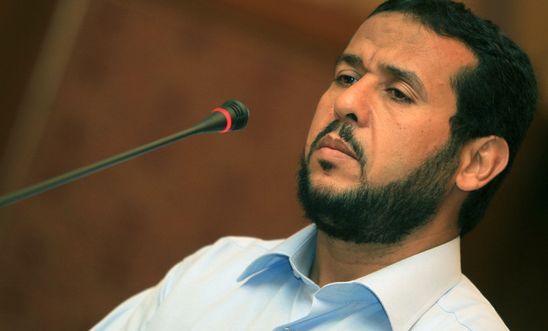
Press releases
UK’s highest court dismisses Government attempt to block cases seeking justice for UK involvement in torture and kidnap abroad

Amnesty International and other leading human rights organisations have hailed a landmark decision of the UK Supreme Court to hold the UK Government accountable for its role in human rights abuses overseas.
The country’s highest court has issued a long-awaited judgment in the two joined appeals in Belhaj and Others v Jack Straw & Others and Rahmatullah v Ministry of Defence and Another.
The Supreme Court has ruled that the UK Government could not rely on the legal doctrines of “sovereign immunity” and “foreign act of state” to escape claims in the two cases alleging UK involvement in breaches of human rights by foreign governments.
The first case, brought by the former Libyan opposition leader Abdul-Hakim Belhaj and his wife Fatima Boudchar alleges that UK Government officials were complicit in the couple’s kidnap and rendition to Gaddafi’s Libya, where they were arbitrarily imprisoned and tortured. The second case was brought by Yunus Rahmatullah, who was detained by UK forces in Iraq before being handed over to US forces and allegedly tortured and imprisoned without charge for over ten years.
The Government had argued before the Supreme Court that the claimants’ cases should be dismissed because - under the sovereign immunity and foreign act of state doctrines - the UK courts were not permitted to rule on the legality of acts by foreign governments. The claimants argued in response that the doctrines only applied in certain limited situations, and that they did not extend to the circumstances in their own cases.
The claimants’ position in the Belhaj case was supported by several prominent human rights organisations - Amnesty International, The International Commission of Jurists, JUSTICE and REDRESS, who intervened in the case. The intervening organisations argued that dismissing the claims would effectively grant impunity for torture to UK officials, violating international human rights law and weakening international commitments to an effective remedy for torture and other ill-treatment, enforced disappearance, arbitrary detention and other human rights breaches.
The Supreme Court found unanimously in favour of the claimants and dismissed the Government’s appeal. It ruled that the doctrine of sovereign immunity did not apply because the foreign governments were not parties to the cases and their legal positions were not affected by the claims put forward. In respect of foreign act of state, while the judges differed marginally in their reasoning, they agreed that the doctrine could not be invoked for such serious violations of law as torture, unlawful detention and enforced disappearance.
The Belhaj and Rahmatullah cases will now proceed to full trials, where the courts will examine the facts of the claims and determine whether the UK Government and its officials were complicit in the claimants’ torture and other human rights abuses.
Amnesty International’s Senior Legal Adviser and Head of International Justice, Solomon Sacco, said:
“It should have been obvious that claims that the UK authorities were complicit in torture must be heard by UK courts. The UK Government should never have tried to prevent the courts from hearing these shocking cases. No government should be able to escape judicial scrutiny of its possible role in such heinous acts simply because doing so could implicate another country.”
JUSTICE Director Andrea Coomber said:
“After such lengthy proceedings we are heartened that the Supreme Court has finally placed within the jurisdiction of the UK courts consideration of serious and unlawful acts like these alleged to have been committed by our Government against individuals overseas. The time has come to hold governments to account for their actions in response to the threat of terrorism.”
The International Commission of Jurists’ Legal and Policy Director Ian Seiderman said:
“The UK Supreme Court has spoken forcefully in affirming that the public interest in ensuring access to justice for victims of serious human rights abuses is paramount. Human rights are universal and their effective enforcement must not be blocked by misapplied juridical doctrine that contrives to deny victims a remedy.”
REDRESS Director Carla Ferstman said:
“Today’s decision sets a significant precedent that the UK Government can be held accountable for its alleged role in torture and other abuses overseas. It is an important reiteration of the commitment to the rule of law at a time when the UK’s international human rights responsibilities and the people defending them are coming under increased pressure.”
Notes for editors
In December 2013, the High Court struck out the civil lawsuit brought in Belhaj, holding that the foreign act of state doctrine precluded the court from hearing the case. The judgment can be accessed here.
In October 2014, the Court of Appeal overturned the High Court’s decision in Belhaj, ruling that neither sovereign immunity nor foreign act of state applied to bar the claimants’ claims. The judgment can be accessed here.
In November 2014, the High Court found in Rahmatullah that neither sovereign immunity nor foreign act of state barred the claimant’s claims. The judgment can be accessed here.
The UK Government appealed in both Belhaj and Rahmatullah, and the appeals were joined at the Supreme Court.
The NGOs were given permission to intervene at the Supreme Court in Belhaj and were represented pro bono by Martin Chamberlain QC, Oliver Jones and Zahra Al-Rikabi of Brick Court Chambers in their intervention. The UN Special Rapporteur on Torture and the UN Chair - Rapporteur on Arbitrary Detention were also granted permission to intervene. A full copy of the NGO interveners’ written submissions is available here.
The Supreme Court heard arguments from 9 to 12 November 2015.